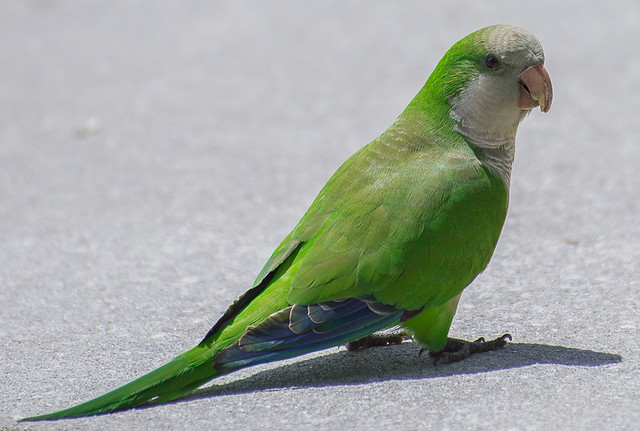 |
Monk Parakeet or Quaker Parrot (Myiopsitta monachus). (Photo credit: Wikipedia)
|
Results would be better if just one member of the family would teach a parrot how to talk. Even so, you can hear the bird imitating the other members of the family as well.
Have you seen a Quaker parrot up close? It is a mid-sized engaging parrot, growing to around 1 foot in length. A Quaker parrots' top is bright green, its chest and face are colored white to grey, although as years have gone by and breeding has taken place, the colors have changed a little
The family's pet parrot
Two things can describe this parrot: affectionate to its owners and very gentle. This makes it perfect for little family members. Larger parrots on the other hand might not be since they become aggressive when mad.
Color
Originally, these Quaker parrots were green and white but since the species evolved during the years, and due to breeding in captivity, there are a variety of color combinations and different shades, too.
Toys
An active parrot likes to play around with toys, especially if he is home alone or when there is no family member available to play with him. A climbing gym, the ones with bells is a good example and will surely keep him amused for a very, very long time.
Would you consider keeping a Quaker parrot as a pet?
This kind of parrot would be a very good pet not just because it is affectionate and gentle but it adapts well to different environments. This is a very big advantage when keeping a pet bird but we all know that if there is a positive side, there must be a negative side.
Some states do not allow keeping the Quaker parrot as a pet. Because it can adapt well, these parrots that have often flown away have caused problems in the agri-industry and that's why they have been considered illegal. Sadly, if these are found anywhere in the states, they will be killed. Check laws first before considering buying a Quaker parrot, especially if you live in the southern areas of the United States.
If you do decide to keep a pet bird then you will find parrot Quaker training easy because of its intelligence.
|








